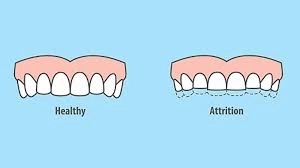
The Link Between Teeth Grinding and Jaw Pain – Dr. Ahmed Husseiny Okaz Explains
Published on: 2025-06-23 | Written by: Dr. Ahmed Hosseini Ibrahim Akkaz, Specialist in Oral and Dental Implants and Cosmetics
Dr. Ahmed Husseiny Okaz, Specialist in Dental Implants and Aesthetic Dentistry, explains that many patients are unaware of the strong connection between teeth grinding (bruxism) and temporomandibular joint (TMJ) disorders. Jaw pain or chronic headaches may actually stem from an unconscious habit that occurs during sleep.
In this article, Dr. Ahmed Husseiny Okaz discusses the causes of teeth grinding, how it affects the jaw joint, and what treatment options are available.
What Is Teeth Grinding and Why Does It Happen?
Teeth grinding, or bruxism, is the involuntary clenching or grinding of teeth—most commonly during sleep. It may be triggered by:
-
Stress and anxiety
-
Sleep disorders
-
Misaligned bite
-
Unconscious neuromuscular habits
Dr. Ahmed Husseiny Okaz notes that patients often don’t realize they grind their teeth. Instead, they report symptoms such as morning headaches, jaw soreness, or noticeable tooth wear.
How Is Teeth Grinding Related to the Jaw Joint?
The temporomandibular joint (TMJ) connects the lower jaw to the skull and is one of the most frequently used joints in the body. Chronic teeth grinding can lead to:
-
Muscle fatigue in the jaw
-
Joint inflammation or cartilage damage
-
Clicking or popping sounds when opening the mouth
-
Restricted or deviated jaw movement
According to Dr. Ahmed Husseiny Okaz, some patients even experience chronic headaches or ear pain due to the excess pressure on the joint.
How Is It Diagnosed?
Diagnosis typically includes:
-
Clinical examination of the jaw and TMJ
-
Observation of tooth wear patterns
-
Panoramic or 3D imaging to assess joint condition
Dr. Ahmed Husseiny Okaz may recommend a custom-made night guard to protect the teeth and reduce joint stress during sleep.
What Are the Treatment Options?
Treatment depends on the severity of the condition:
-
For mild cases: a night guard to prevent grinding
-
Managing stress and anxiety
-
Physical therapy exercises to strengthen jaw muscles
-
In more advanced cases: botox injections to reduce muscle tension or referral to a TMJ specialist
Conclusion
Teeth grinding is often an unnoticed habit that can significantly affect the health and function of the jaw joint. Dr. Ahmed Husseiny Okaz advises patients to seek dental consultation if they experience jaw pain or morning headaches, in order to prevent chronic complications and protect the TMJ.

